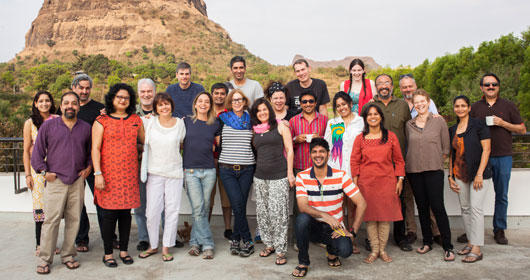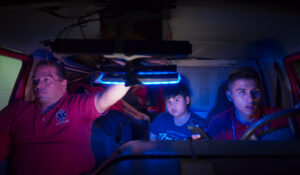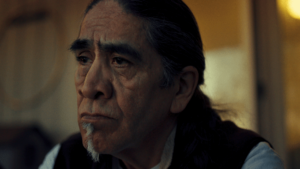Fellows and advisors at the Mumbai Mantra | Sundance Institute Screenwriters Lab. Photo by Dani Sanchez-Lopez | Bernat Camps
Dylan Mohan Gray
Every year, in collaboration with our hard-working partners and amazing hosts Mumbai Mantra (Mahindra), we conduct a Screenwriters Lab in India that supports eight emerging independent voices in Indian cinema. The following post comes from screenwriting fellow Dylan Mohan Gray.
I thought that writing a few paragraphs about my experiences at the Sundance Institute | Mumbai Mantra Screenwriting Lab would be a piece of cake.
I would begin by mentioning how I submitted my script mainly for the deadline, or more pertinently for the external discipline it would hopefully impose upon me to finish a new draft. That’s not to suggest I didn’t care whether I got selected… it frankly sounded like paradise, and a couple of friends who had been part of previous editions testified to the accuracy of this impression.
Everyone you meet who has ever been part of Sundance will tell you it is something akin to joining the Cosa Nostra. Once they have chosen you, they never let you go.
—Dylan Mohan Grey
Somehow, perhaps as a defense mechanism, I felt my project might seem to be a bit odd and unusual, and possibly too political in an Indian context to appeal to whomever was making the fateful decision. I’m not usually the type to get selected for things, and rather tend toward plowing forward with ideas and seeing how they turn out.
The project I submitted, tagged with the working title “The Last Day of Winter,” is based on a story which came to me one ordinary afternoon quite a few years ago. I often describe it as a political parable, based on the idea of extrapolating what kind of country, or world, we would be living in if all the petty corruptions and degradations we in India take upon ourselves on a daily basis were to be played out to their logical conclusions.
I enlisted my friend Vikramaditya Motwane as co-writer, and we hammered out a promising draft. Then we both got busy with other directing projects and “LDoW” was put on the backburner.
Some years passed as I struggled to make Fire in the Blood, in my suffering and perceived isolation often wistfully casting my mind to Vinit, the young protagonist of my script. The actors I’d had in mind when writing had all begun to become too old for the parts we had written. I felt like a neglectful parent, sidetracked by life’s quotidian labours, but still enthralled by the beauty and intelligence of his progeny. How would I ever find a way to recapture Vinit’s favour?
Fire in the Blood was in competition at the 2013 Sundance Film Festival, and the two weeks I spent in Park City provided the most exhilarating, affirmative, and gratifying experience any filmmaker could ever hope for. The kindness, generosity, wisdom and love of the art form I encountered there surrounded by the snow-capped peaks of Utah exceeded anything I have come across before or since.
The incredible care with which the selection was curated, the immense sense of responsibility the people who run the festival feel for promoting, incubating, encouraging and giving a platform to all that film at its best can be; the enthusiasm for having us (filmmakers from all corners of the world) there to celebrate what for almost all was the premiere of their film after many months and years of extremely hard work; the importance they placed on putting us together, creating a tight network of exceptionally talented (barring the odd outlier like myself) people with truly unique voices.
Everyone you meet who has ever been part of Sundance will tell you it is something akin to joining the Cosa Nostra. Once they have chosen you, they never let you go. You’re part of the family. From the first get-to-know-you meeting we had in Juhu for the eight screenwriting fellows, mentors, and facilitators, I felt all of that flooding back. I’ve been to many, many festivals in lots of countries, attended film events, conferences, markets, and workshops, and met many people strategising to create such things over the years, but Sundance is really light-years ahead of them all in terms of aspiration and sheer force of belief in the projects they select.
As my fellow fellows began describing their projects, stories and journeys, I felt a strong sense yet again of the immense care and thought which went into bringing this specific group of people together. Levels of experience varied widely, from an Oscar nominee to a woman who had nervously left her corporate career behind to pen her first script, and the projects presented undeniably diverse flavours, but there was a harmony forming in the voices through which the careful, conscious calibration of this particular group could begin to be discerned, even after just a few minutes.
I had been surprised to be selected because I thought my script would be far different in sensibility to what was being sought, but as the other writers began to reflect on their ideas, I could clearly see there was a distinct reason for me, and all the others, to be there, together. During the lab, once we had retreated to the idyllic, serene, perfectly suited setting of Pavna Lake, Lonavla, we had a chance each day to watch and discuss the previous works of fellows and mentors. This added immeasurably to our individual and group discussions, both about process and our own individual scripts.
Each day I would have one or two sessions with mentors to discuss my script. These sessions ranged in length from two to four hours. It was extremely humbling to realise how much thought and work the mentors put into getting to the heart of our scripts. In my case, they all approached the project in different ways, from varying angles.
Each morning the mentors would get together and discuss the projects among themselves, to make sure that each session built upon the last and wasn’t simply a repeat of conversations which had taken plays on days prior. The idea was not to for us to write, or rewrite, but to explore and question all aspects of the concept, the conflicts, the characters, and the process of bringing them as successfully and authentically as possible to the screen.
I could see the responses for some of my fellow writers ranged from exhilarating highs to despair-filled lows. Some had great epiphanies and completely re-envisioned their scripts. All were demonstrably energised and empowered. For myself, I had deliberately not spent a great deal of time with my script in the run-up to the lab. I had done a some rewriting last August and September in order to get it ready for the submission deadline after not so much as looking at it for a couple of years, but I wanted to listen as closely as I could to the feedback which would come at the Lab and let it wash over me without taking things too personally or becoming overly protective of certain aspects of the script.
Although it was evident that someone liked the project enough to select it from among all the hundreds of submissions, I had never really had any feedback on it from ‘outside’ people (meaning those not either very close to me or part of the presumptive team which would eventually be making the film). I always believed in the story: the fact that it had always stayed with me and grown in force over long years was enough to reinforce my instinctive belief that it needed, and needs, to be made. My experiences in the past have taught me to always trust that inner voice over all else.
Nonetheless, it was eminently clear to me that for this story to achieve its potential, I’d need a lot of input from people with no small degree of wisdom, experience and skills different than my own. It was an incomparably beautiful and wonderful gift to have had the chance to spend these five days with the group of people Sundance and Mumbai Mantra brought together for this lab.
The mentors’ intense passion for exploring, discovering and in an ideal world elevating the art form was incredibly infectious and humbling at the same time. For globally admired writers at the very top of the profession to give so much of themselves (one of my mentors sketched out all the scenes of my film) was, on the one hand, profoundly moving, and on the other, a powerful reminder of how much we as filmmakers, creative people, or even individuals trying to do anything to affect movement and change must strive to support one another, and understand that no one who has ever come anywhere close to doing something meaningful has done so without having someone reach out to help.
The lab was an onslaught of torrid input and mental gymnastics, thoroughly exhilarating and exhausting. The carrot and stick of affirmation and challenge, hard questioning and the odd eureka moment, an emotional wringer marinated in positivity, good will, lifetimes of writing chops and tough love—no description I can muster will ever be able to do it justice.
I wish for everyone to experience this kind of creative energy tsunami at least once or twice in their lifetime. Leaving was a trauma of sorts, a harsh return to the everyday life of trying to write, and all the other things we try to do. This was the first time in my life I could be a writer and nothing else for five whole days.
The feedback I received clarified a thousand things in my mind and underscored my belief, echoed by those who so ruthlessly raked me over loving coals, that the film I’m determined to make from this script is one which absolutely must be made. The power of the support and passion I have received during the course of this Lab is something I can’t imagine ever forgetting.
Having had a week to decompress, reflect, and reintegrate into the mortal world, I feel so immensely grateful to have been included in the group which Sundance Institute and Mumbai Mantra in their infinite wisdom selected for this Lab. The constantly-repeated refrain that the Lab itself is “only the beginning” of the process, and the relationship to Sundance and each other, is both reassuring and credible.
I know the other fellows share my sentiments when I say we look eagerly forward to being there for each other throughout the process of bringing our respective works to the screen, and that each resulting film will be a source of pride to us all.




